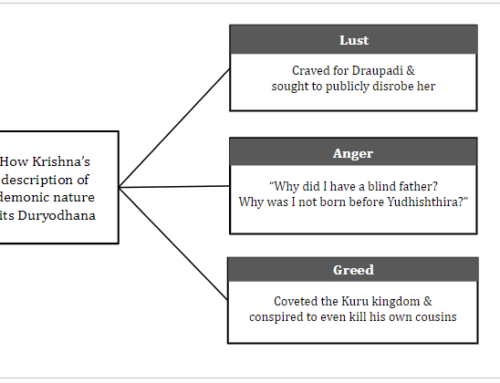
It is easy to be wise after the experience. After things have happened and consequences are being endured, we can mentally retrace the events and think of things we could have done differently to get a better result.
But mental retracing can’t undo the physical doing – once a thing is done, it’s done forever. Maybe we can do it differently next time, but that particular error has already happened, permanently and irreversibly. So, experience is like intelligence’s rear light; it shows the path only after we have already traversed it.
Can our intelligence have a front light – something that illumines the terrain ahead so that we can choose the best path? Can we know the consequences of actions before we make choices?
Yes, we can through scripture, for it is the word of God who being the ultimate maker of the world knows the inbuilt connections between actions and their reactions. Thus scripture recommends actions that bring auspicious results and discourages action that brings inauspicious result. No wonder the Bhagavad-gita (16.24) urges us to choose our actions based on scriptural guidance. Even if we can’t accept scripture a priori, that is, before we make choices, at least we can learn from it a posteriori, that is, after we get the consequences. For example, we may not believe, as the Gita (05.22) informs, that sensual pleasures bring misery, but at least after experiencing their attendant complications, we can accept the truth of scripture.
Thankfully, we don’t have to go through misery to realize this. By making the virtuous and spiritual choices that scripture endorses, we can experience, as the Gita (09.02) declares, how they make our life joyful (su-sukham).
Thus, by accepting scripture as the front light of our intelligence, we can make our life journey smooth and supremely auspicious.
Bhagavad Gita Chapter 16 Text 24
"One should therefore understand what is duty and what is not duty by the regulations of the scriptures. Knowing such rules and regulations, one should act so that he may gradually be elevated."


Thank you Pr for sharing this article and helping us to realize the importance of scriptures in one’s life…,
Scriptures are important for our progress.
Thank you Prabhuji!
I agree with Suresh prabhuji. Thank you.
I think it is very wise to follow skripture and mould our daily life to focus on loving devotion towards Lord Krishna , there by completely surrender to him and accept his guidenence and benovalence.
Thank you Prabhuji,Hare Krishna.
So true, and the rear light, being red, can serve as a warning to others – don’t take this path, there’s danger here. Follow the white light, the front light, Krishna’s light.